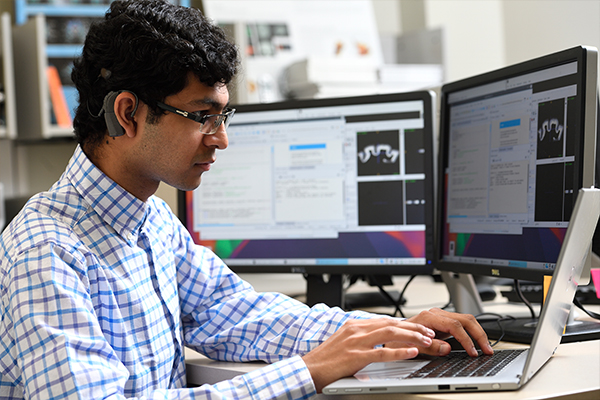Meet the BME summer student researchers: Rachit Kumar

Each summer, approximately two dozen high school and undergraduate students join the Johns Hopkins Department of Biomedical Engineering for the opportunity to gain hands-on research experience under the mentorship of our pioneering faculty. Meet Rachit Kumar, one of five undergraduate students with hearing loss who will conduct research in Johns Hopkins auditory science and engineering labs this summer as part of the STEM-HEAR initiative spearheaded by Tilak Ratnanather, associate research professor of biomedical engineering.
Name: Rachit Kumar
Hometown: Loveland, Ohio
School: Georgia Institute of Technology
Mentor: Tilak Ratnanather, associate research professor of biomedical engineering
Can you tell us about yourself?
I was born profoundly deaf in both ears, and received a cochlear implant in my right ear just before I turned two years old. My experience with a cochlear implant has led me to pursue a career that would allow me to give back to the communities that gave me a full life. I was very lucky to attend a good public school that continually encouraged my curiosity and desire to keep learning.
Why are you interested in pursuing research this summer?
“Research” is an incredibly broad term, and there are literally thousands of fields of research. My goal this summer is to narrow my research interests even more, especially in a way that would allow me to contribute significantly to multiple projects at one time. I also have the incredible opportunity to work with Dr. Tilak Ratnanather, a scientist whom I have admired for a long time because he is also hard-of-hearing and has met with great success in spite of—or more likely, because of—that challenge.
Can you describe your research project?
I am currently working on finding and implementing traditional computer vision techniques to automate the denotation of layers of the brain from imaging and histological data. I am also exploring the idea of building and training a convolutional neural network to perform a similar task.
What do you hope to learn or gain from this experience?
I have already learned so much about the nature of working in a computational, or “dry,” lab, and this has given me a unique perspective on the differences in environment and expectations compared to a more typical bench, or “wet,” lab. I also hope to learn more about the nature of working on, writing about, and presenting computational research.
What are your plans for the future?
After graduating with my degree in biomedical engineering, I plan to apply to MD-PhD programs. I want to pursue an MD-PhD so that I can marry my clinical and research interests while also contributing to both of those communities, in part as a “thanks” for their enormous investment in me when I was younger. I was given the opportunity to hear, which helped me through my childhood.
How has your hearing loss affected your educational experiences?
I initially resented my hearing loss because of how limited I sometimes felt, but over time, I’ve come to appreciate the unique challenges it’s presented to me. Through these challenges, I was able to learn how to work around my limitations. I became better equipped to deal with difficulties, which helped me to challenge myself academically and to continually push my limits to try to improve myself.
How will your experience at Johns Hopkins this summer help you achieve your goals?
This experience will hopefully give me the opportunity to further define my interests and determine where I would like to go with my education. I also have the chance to work and collaborate with so many world-renowned professors, as well as like-minded students who are as motivated as I am to work for their future. I have also had the opportunity to learn many techniques in computational research that I will certainly be able to leverage as I move forward in my education, both at my home institution and beyond.
